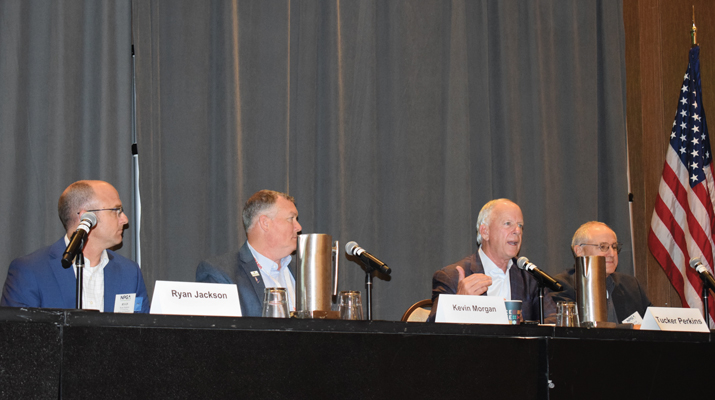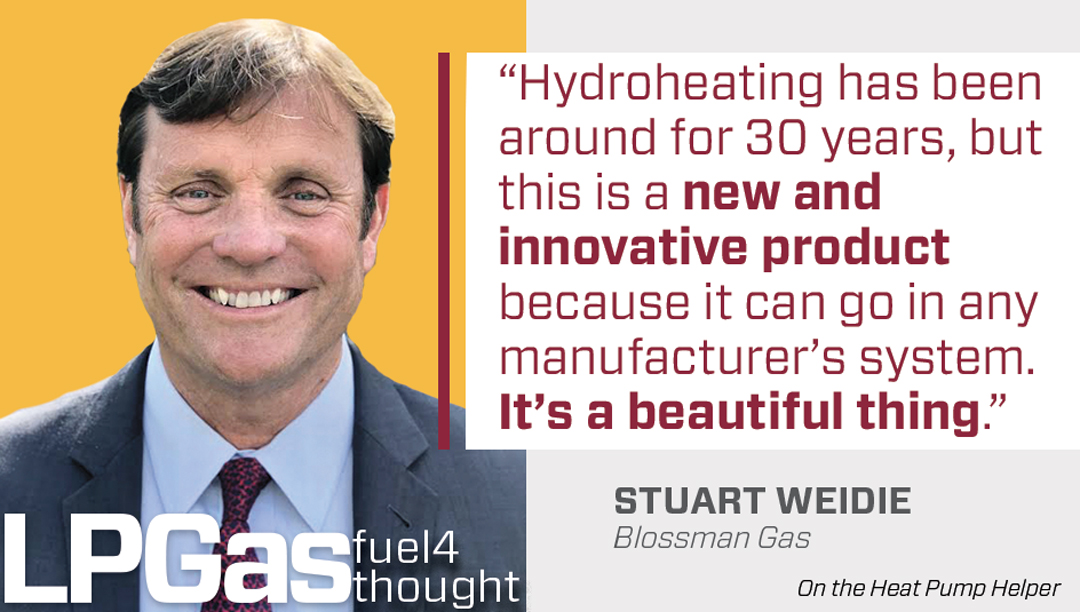Industry promotes adoption of hydronic heating technology

A Heat Pump Helper panel discussion at the NPGA fall board meeting in Louisville, Kentucky, included, from left, Ryan Jackson of D.F. Richard Energy, Kevin Morgan of Rinnai, Tucker Perkins of PERC and Bruce Swiecicki of NPGA. (Photo by LP Gas staff)
A new industry program is giving propane marketers and their employees an opportunity to test hydronic heating technology in their own homes before promoting the solution to their customers.
The backup space heating application, called the Heat Pump Helper (HPH), is designed to provide an efficient, cost-effective and comfortable alternative to electric resistance strip heating in an air-source heat pump. Propane industry leaders say the HPH can boost gallons in the residential market and keep propane relevant amid the expansion of electric heat pumps.
To build knowledge and momentum in the market, the Propane Education & Research Council (PERC) approved a 2024 HPH personal use program at its November meeting in San Antonio. PERC’s one-year, $400,000 program provides $8,000 to each participating state and requires the state to match the amount with its own rebate dollars. The funds cover the purchase of up to 10 HPH units, at $1,600 each, per state.
In return, propane industry member participants are required to share data and feedback – from the installation process to the performance of the product as well as other perspectives – through a PERC survey about the HPH.
“It’s intended to be a quick-hitting program to get some of these products installed across the country and get feedback,” says PERC COO Bridget Kidd, in presenting the docket to the council.
During the council meeting discussion, PERC President and CEO Tucker Perkins emphasized the point of the program: “We don’t envision this to be done by the general public. We envision this to be [done by] employees of propane companies that are championing this product.”
Kidd adds, “The intention is to create champions within the industry who have experience both on the installation and the performance of the system so they can go out and expand the use of the product.”
The HPH is based on hydronic heating – a decades-old concept of using hot water as an energy source for space heating. It allows propane marketers to convert homes with new or existing electric heat pumps to dual-fuel space heating systems by installing a gas-fired water heater or boiler or using one already on-site. Industry leaders cite the tankless models for their high flow rates and overall technological advancements.
The HPH is a trademark of North Carolina-based Bindus Manufacturing, which develops the hydronic heating coil – called the Aquecoil – used in the system. It is one of several companies, including Rinnai, working to support propane industry solutions for the electric heat pump.
“The biggest barrier is the resistance to change,” says Armistead Mauck, the HPH project manager for PERC. “What we have done with PERC’s help, Bindus’ help, Rinnai’s help is remove barriers.”
Stuart Weidie, president and CEO of Blossman Gas and a PERC councilor, says the heat pump market has massive potential for the propane industry.
“This is our answer to the heat pumps being incentivized and going everywhere,” says Weidie, whose company is one of the early adopters of the HPH technology. “Hydroheating has been around for 30 years, but this is a new and innovative product because it can go in any manufacturer’s system. It’s a beautiful thing.”
Virginia became the first state to access the national funding after PERC approved a new concept state rebate program for the HPH, opening the door for other states. The council awarded $9,575, including project management and administration fees, to the Virginia Propane Research & Education Foundation.
Zach Eisenman, executive director of the Virginia Propane Gas Association, cited a core group of members spearheading the initiative in the state: Randy Doyle of Holtzman Propane, Jamison Walker of Blossman Gas, Tom Krupa of NGL Supply Co. Ltd. and Scott Heishman of Tarantin Industries.
The state formed a committee to explore opportunities with the HPH and gauged the support of its members, with positive results, Krupa says. Bindus and Rinnai attended the state’s fall meeting and displayed equipment in the installation kit.
“Heat pumps have become the standard for builders. It’s an easy install and easy sell, so we’re trying to go after that market because we think there is real potential,” says Krupa, citing cold temperatures that can spike electric bills by hundreds of dollars a month in the winter.
The foundation believes the HPH, when used as an electric heat pump backup, will add 200 to 400 gallons per 2,500-sq.-ft. home in a Virginia winter. The gallons range from 400 to 600 if the hydronic system is used as the sole space heating source.
More than 20 states showed early interest in the program, Kidd explained during the council meeting. Marketers are encouraged to check with their states to see if they are participating in the program, and participating states are encouraged to “recruit” marketers for their 10 test installations.
The development of the HPH personal use and rebate program was the result of discussions within PERC’s Advisory Committee and working groups.
Project leaders say …
“It’s easier to stick a heat strip in place, easier to put an electric water heater in place, and the kind of tradesman that is only invested in the ‘whatever’s easiest,’ this is not going to be for him. It never has been. If there’s an obstacle to be met, it’s changing the minds of those folks.” – John Borzoni, Bindus Manufacturing
“What I try to tell a contractor is don’t put in a heat pump and get a callback because you’re not supplying the correct amount of heat for the home to support that consumer’s demand or requirement. This system will allow them to put in what the government wants and get the heat load they need for the house.” – Kevin Morgan, Rinnai America Corp.
“We’re seeing collaboration between marketers; marketers making it easier for other marketers; marketers getting in the same room at state association meetings and sharing their positive experiences.” – Armistead Mauck, Heat Pump Helper project manager for PERC
Takeaways for marketers
▶ The Heat Pump Helper (HPH) allows propane marketers to convert homes with electric heat pumps to dual-fuel space heating systems by installing a gas-fired water heater or boiler or using one already on-site. Industry leaders cite the tankless models for their high flow rates and overall technological advancements. The backup system integrates a water heater, hydronic coil and air handler to heat the home when temperatures drop and the heat pump can’t keep up. Most importantly, industry leaders say, the configuration replaces the electric heat strip, bringing comfort and cost savings to the consumer.
▶ The 2024 HPH personal use and state rebate program is geared for propane marketers and their employees who are interested in installing a HPH in their home. However, they first must ensure their state is participating in the program. Marketers are encouraged to check with their states about the program. At the same time, state executives adopting the program must recruit those marketers interested in providing their homes as a trial for the project. The program supports 10 trials per state.
▶ Ideally, according to PERC, states would continue to submit applications for the program in the first quarter of 2024. HPH installations would take place in the second and third quarters so the systems are in place to test during the 2024-25 winter heating season and PERC can begin to collect survey data.
▶ PERC offers a download about hybrid heat pumps powered by propane.
About this section
This month’s special section gives propane retailers the information and knowledge they need to understand and promote the industry’s hybrid heat pump, an advanced, hydronic space heating solution that serves as a backup to the electric heat pump. Added power generation features can allow retailers to provide a full heat and power solution to customers.

















